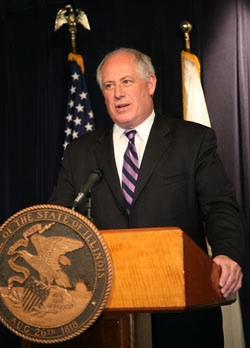Quinn Doomsday Budget Will Doom Care for Abused and Neglected Children, Feigenholtz and Trotter Need to Rally Madigan, Cullerton
(Springfield, IL) —Governor Pat Quinn’s recent doomsday budget announcement offered no detail on the Illinois Department of Children and Family Services or on the child service budget lines within the Department of Human Services.
But we can offer an educated guess: a budgetary bloodbath.

Governor Pat Quinn
At DCFS, if Quinn’s average 37% cut is applied across the board, its budget would end up at about $850 million—almost $500 million less than currently budgeted.
Last year, when DCFS weighed $75 million in cuts, those cuts would have eliminated 40% of system of care, threatening to explode caseloads.
Quinn is now talking almost 7 times that much.
The Child Care Association of Illinois would anticipate if that degree of cut was made, all child caseloads would have to be increased to the maximum allowed by consent decrees (20 for foster care) plus more in caseloads that are not subject to consent decree.
Under those conditions, the abuse and neglect suffered by children would simply be committed by the state of Illinois.
All programs with minimal or no federal funding stream would be cut—much of the family preservation line, certain counseling, quite a bit of training would be gone. Even with that amount cut, DCFS could not achieve the budget reduction goal. DCFS would need to decrease private agency rates too.
On the DHS side, Community Health and Prevention Division would decrease from $237 million to $149 million—a loss of $88 million. Some of the budget lines are so small they could not absorb a 37% reduction and still be viable. They would just be eliminated. If the private youth services agencies thought 10% would be the end of the program, a 37% cut would be unfathomable.
The Department of Juvenile Justice has not much to cut, unless they eliminate entire wings of facilities. If they eliminate all aftercare, they still would not make their budget cut share.
Juveniles would be released from corrections with no aftercare services, although it is unsure how much leeway Governor Quinn has on releasing either juveniles or adults who have been duly sentenced to specific timeframes under the law.
For the Illinois State Board of Education, we cannot even predict how they would cut. Another budgetary bloodletting.
The Chairs of the House and Senate Human Services Appropriations committee—State Representative Sara Feigenholtz and State Senator Donne Trotter—need to communicate to House Speaker Michael Madigan, House Minority Leader Tom Cross, Senate President John Cullerton, and Senate Minority Leader Christine Radogno that state human service agencies and the vulnerable citizens they would cease to exist in any recognizable form after such budgetary ax swings.
The members of Senate Appropriations Committee—Jeff Schoenberg, Jacqueline Collins, William Delgado, Mattie Hunter, Mike Jacobs, Emil Jones, Matt Murphy, Pam Althoff, Tim Bivins, Chris Lauzen and Dave Syverson as well as the House members Harry Osterman, Rosemary Mulligan, Patricia Bellock, Beth Coulson, Keith Farnham, Jehan Gordon, Deborah Graham, Elizabeth Hernandez, Eddie Jackson, David Leitch, Deborah Mell, Kathy Ryg, Angelo Saviano, Tim Schmitz, Darlene Senger, Ron Stephens, Mark Walker, and Eddie Washington—need to deliver the same message to legislative leaders.
Voters will be watching.
Explore posts in the same categories: DCFS, DHS, Governor Pat Quinn, Illinois Budget, Illinois State Board of EducationTags: Angelo Saviano, Beth Coulson, Chris Lauzen, Darlene Senger, Dave Syverson, David Leitch, Deborah Graham, Deborah Mell, Donne Trotter, Eddie Jackson, Eddie Washington, Elizabeth Hernandez, Emil Jones, Governor Pat Quinn, Harry Osterman, House Minority Leader Tom Cross, Illinois abused and neglected children, Illinois Budget, Illinois Department Children Family Services, Illinois Department of Human Services, Illinois politics, Jacqueline Collins, Jeff Schoenberg, Jehan Gordon, Kathy Ryg, Keith Farnham, Mark Walker, Matt Murphy, Mattie Hunter, Mike Jacobs, Pam Althoff, Pat Quinn doomsday budget, Patricia Bellock, Ron Stephens, Rosemary Mulligan, Sara Feigenholtz, Senate Minority Leader Christine Radogno, Senate President John Cullerton, Speaker Michael Madigan, Tim Bivins, Tim Schmitz, William Delgado
You can comment below, or link to this permanent URL from your own site.
May 28, 2009 at 2:27 pm
How is it that a mere return to spending levels that were regarded as perfectly normal just six years ago now constitutes “doomsday”? Goodness, if I were to return to my own spending levels of just six years ago, everything for me would be … exactly the same. So why don’t we and the governor and the legislature cut the crap and cut the spending along with it?
June 14, 2009 at 7:39 pm
Mr. Ziffer,
The state is unable to reverse the increases in the prices of food, rent, property taxes, insurance, utilities, salaries, health care, or natural population growth and the demand on the services. That’s the economic problem.
June 15, 2009 at 4:44 pm
I am a case worker in the foster care system at a large POS agency. I simply do not see how the system could function in this situation. I refuse to work with an exploded case load on ethical grounds. I work to try to improve my community (its certainly not the pay) and if this happens I will be causing more harm then good.